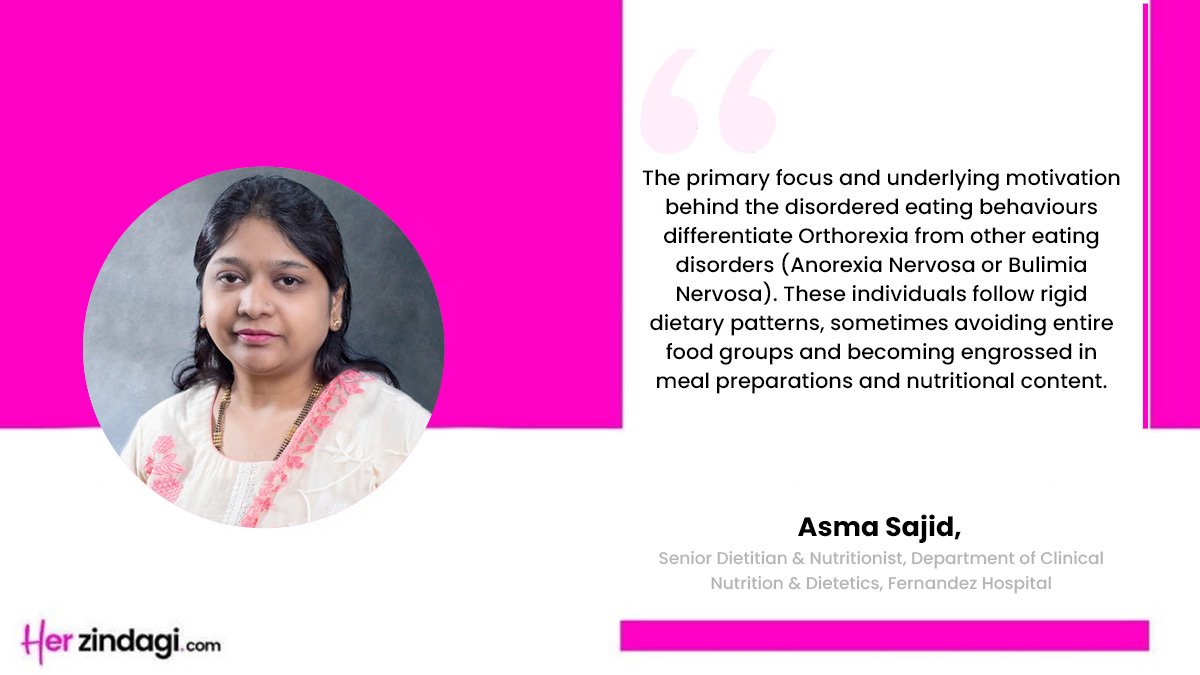
Many people have been practicing mindful eating lately to stay healthy. While eating mindfully is important, becoming obsessed with healthy eating is called Orthorexia Nervosa. “Despite not being formally recognised in the Diagnostic and Statistical Manual DSM-5 TR, public interest in orthorexia is on the rise and remains a subject of continuous debate for its detrimental effect on both mental and physical health”, says Asma Sajid, Senior Dietitian & Nutritionist.
People with orthorexia focus intensely on the quality and purity of their food to the point where it can interfere with their daily lives, relationships, and physical and mental health. To know about this in depth we got in touch with, Asma Sajid, Senior Dietitian & Nutritionist, Department of Clinical Nutrition & Dietetics, Fernandez Hospital, to shed some light on this topic:
The term Orthorexia or Orthorexia nervosa (ortho = correct, orexis = appetite) was first used by Dr. Steven Bratman in 1997. He noticed this eating behavior in people who were overly focused on eating in a ‘Healthy’ way. A study by the National Institutes of Health (NIH) states that, “Orthorexia nervosa is perhaps best summarized as an obsession with healthy eating with associated restrictive behaviors. However, the attempt to attain optimum health through attention to diet may lead to malnourishment, loss of relationships, and poor quality of life.”

Our expert Asma Sajid, Senior Dietitian & Nutritionist, Fernandez Hospital says, “The primary focus and underlying motivation behind the disordered eating behaviours differentiate Orthorexia from other eating disorders (Anorexia Nervosa or Bulimia Nervosa). These individuals follow rigid dietary patterns, sometimes avoiding entire food groups and becoming engrossed in meal preparations and nutritional content.”
i) Spending too much time shopping for, planning, and making meals that are seen as ‘Healthy’.
ii) Cutting out certain types of food like carbs, or processed foods without any medical reason.
iii) Feeling anxious or guilty after eating food that is considered ‘Unhealthy’.
iv) Constantly checking food labels and ingredients.
v) Losing weight or becoming malnourished because of strict food restrictions.
vi) Being overly focused on healthy foods, nutrition, and what you eat.
Don't miss: UTI Surge in Winter: Gynaecologist Explains If It Happens, Causes, Prevention, And Remedies
Orthorexia can be fought with help from different professionals and by changing how we think about healthy eating. Here are some tips to overcome Orthorexia from Asma Sajid, a Senior Dietitian & Nutritionist that will help you manage this:

1. The initial step to address orthorexia is to identify its signs. If your obsession with food quality disrupts your relationships, it might be the right time to get help.
2. Consult a registered dietitian, psychologist, or cognitive behavioural therapist who can provide guidance and support in restoring a balanced diet and coping strategies to manage anxiety related to dietary deviations.
3. Choose a balanced diet meal with optimal nutrients instead of labelling food as ‘good’ or ‘bad’.
4. Be careful while reading on social media and try to follow only evidence-based information.
5. Adequate physical activity, proper sleep, balance in your relationships, and managing your stress are key to holistic and sustainable health.
Mindful eating is good, but when it becomes obsessive, it can harm both your mind and body. If you ever feel this way, talk to a doctor. A healthy, flexible lifestyle that supports your emotional and physical health is important for overall well-being.
For more such stories, stay tuned to HerZindagi.
Image credit: Freepik
Also watch this video
Herzindagi video
Our aim is to provide accurate, safe and expert verified information through our articles and social media handles. The remedies, advice and tips mentioned here are for general information only. Please consult your expert before trying any kind of health, beauty, life hacks or astrology related tips. For any feedback or complaint, contact us at [email protected].